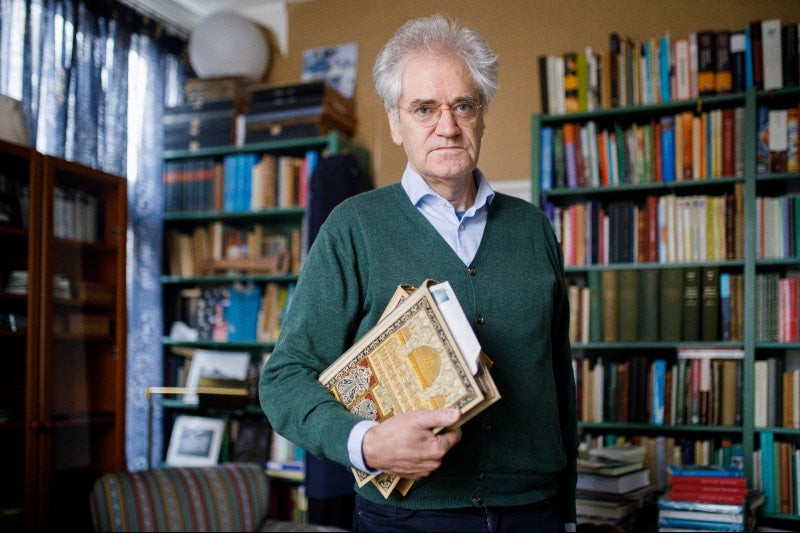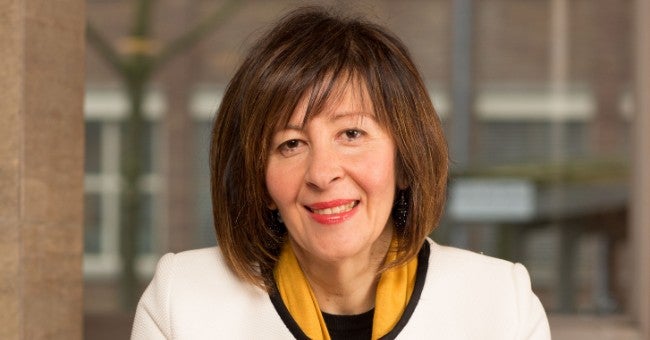George Harinck (62) is professor at the VU and an expert on everything Abraham Kuyper. Based off of Kuyper’s diary entries, Harinck now follows in his footsteps in two TV documentaries.
How did you and Abraham Kuyper cross paths?
„I’d heard of Abraham Kuyper when I was younger, but he only started to make a real impact on me during a history lecture in Leiden. The class was on one of the journeys that Kuyper made through the United States. Really exciting to hear about. When I started working at the VU in 1985, my first assignment was arranging the Kuyper family’s photo archive. Very interesting, because Kuyper was the first public figure that grew up in the age of photography. Therefore, he was the first modern politician that occupied himself with this type of imaging.”
Is that when he won you over?
„After all those years, I still find him very entertaining and if possible, I’d for sure want to have a drink with him. Many people say that Kuyper was a difficult man, which is true – but he was also a nice and mischievous man. He’d pull pranks on his co-workers in the newspaper. Despite his Calvinistic background he didn’t attend church, because then he would be confronted with his own articles being preached there. Yes, he had a moral side to him that I find questionable, but why should we always focus on the negative?”
You’re referring to the racist statements that he made.
„That’s right. Those statements attract more attention when they come from him, because he wrote every little thing down. Everything was published in the papers. His ideas were far from unique during that time, but other people wouldn’t be voicing their convictions so publicly. I’m not trying to justify his claims, but it does put things in perspective.

„Kuyper led a very public and busy life. He worked as a journalist, Member of Parliament and as a professor at the VU. By 1875 he was severely overworked, which is when he left for Southern Europe for a year. After that, he stuck to a very strict daily routine. He’d write from nine until one. If someone rang the doorbell a minute earlier than planned, he would simply refuse to open the door. He left for the Alps every summer, to relax. His family would be one village removed from him, just so that he could enjoy the peace.”
Do you recognise yourself in him in any way?
„He was the founder of contemporary reformed tradition and also was a reformed Christian, just like I am. I endorse his views on democratic society. We as Dutch people often disagree with one another and it’s important to acknowledge that. Kuyper was of the opinion that the healthiest society possible would grow from allowing everyone to follow their own beliefs. Of course that creates tensions, but that’s okay. Democracy is far from easy, but it is the best type of government.”
„As a progressive country, we’d rather focus on the future.”
Still, it seems as if Kuyper isn’t that well-known in The Netherlands.
„When I was younger, he wasn’t necessarily a person that people would often talk about. I didn’t realise his importance until I became a historian. His obscurity can mostly be explained by the fact that his ideas just weren’t very popular anymore. On top of that, Dutch people generally don’t show a lot of interest in history. The way in which the French cherish Napoleon and the British remember Churchill – that’s not really something we do in The Netherlands. As a progressive country, we’d rather focus on the future.”
Is he more well-known in the USA than here?
„Academically speaking, yes. He is widely studied there. The USA currently finds itself in a phase that The Netherlands was in during the 19th century: gradually transitioning from a Christian country into a more liberal country. Trump’s supporters are hopeful that he will bring back a Protestant society. Trump – even though he’s not religious himself – advocates for uniformity as opposed to diversity: christianity only. Biden is a lot more liberal and is of the opinion that religion shouldn’t play a big part. What you’re seeing now, is that Kuyper’s ideas are becoming more relevant again as a compromise: diversity within religion.”
„the series were going to be presented by a Dutch celebrity, but then they approached me for the job."
You followed in his footsteps in the TV show that you created. How did that journey come about?
„Two documentary makers had found Kuyper’s book ‘Om de oude wereldzee’ [‘Around the old world sea’] at a flea market. While they were doing research, I was contacted for more information on Kuyper. Initially, the series were going to be presented by a Dutch celebrity, but then they approached me for the job. It was really, really special to be able to put myself in his shoes. We were constantly asking ourselves things such as: does the hotel where he stayed at still exist? Will we be able to find the building where he met that mayor? Very special.”
Did you learn any new information on Kuyper during your trip?
„How much he loved his children. When he left in 1905, he was a widower and the father of three unwed daughters. While he was traveling, he’d write a letter to his daughters every week. He’d react to whatever was happening in their lives and would share his own feelings. When he was in the Middle East, he grew a mustache. He sent his daughters a picture, to which his youngest daughter responded: ‘Nice moustache, but it needs to go once you’re back in The Hague.’ I thought it was quite nice to discover how much of an involved parent he really was.”








